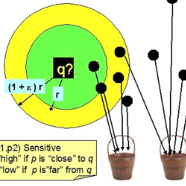We study the problem of \emph{classifier derandomization} in machine learning: given a stochastic binary classifier $f: X \to [0,1]$, sample a deterministic classifier $\hat{f}: X \to \{0,1\}$ that approximates the output of $f$ in aggregate over any data distribution. Recent work revealed how to efficiently derandomize a stochastic classifier with strong output approximation guarantees, but at the cost of individual fairness -- that is, if $f$ treated similar inputs similarly, $\hat{f}$ did not. In this paper, we initiate a systematic study of classifier derandomization with metric fairness guarantees. We show that the prior derandomization approach is almost maximally metric-unfair, and that a simple ``random threshold'' derandomization achieves optimal fairness preservation but with weaker output approximation. We then devise a derandomization procedure that provides an appealing tradeoff between these two: if $f$ is $\alpha$-metric fair according to a metric $d$ with a locality-sensitive hash (LSH) family, then our derandomized $\hat{f}$ is, with high probability, $O(\alpha)$-metric fair and a close approximation of $f$. We also prove generic results applicable to all (fair and unfair) classifier derandomization procedures, including a bias-variance decomposition and reductions between various notions of metric fairness.
翻译:在机器学习中,我们研究了 emph{ claxizer derandomization} 在机器学习中,我们研究的是 \ emph{ clicization 问题: 给一个随机的二进制分类 $f: X\ to [0,1]美元, 抽样一个确定性分类 $\ hat{f} : X\ to 0. 1\ 0. 1 美元 : X\ to = = = = = = = = = = = = = = = = = = = = = = = = = = = = = = = = = = = = = = = = = = = = = = = = = = = = = = = = = = = = = = = = = = = = = = = = = = = = = = = = = =




